|
|
|
Sort Order |
|
|
|
Items / Page
|
|
|
|
|
|
|
| Srl | Item |
| 1 |
ID:
170406
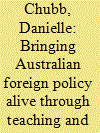

|
|
|
|
|
| Summary/Abstract |
If we are to help students develop opinions and perspectives on world politics, and understand at the same time what it means to hold these opinions and perspectives in the Australian context, we need to bring the world to the classroom. Information overload has led to feelings of alienation among students, and the way we teach needs to instil in students a sense that they are stakeholders in Australian foreign policy, and help them develop strategies for incorporating the complex information environment into their learning. In this short piece I propose two forms of assessment that authentically place the focus on these learning outcomes.
|
|
|
|
|
|
|
|
|
|
|
|
|
|
|
|
| 2 |
ID:
170413
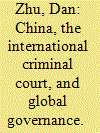

|
|
|
|
|
| Summary/Abstract |
This article explores the Chinese policies towards the International Criminal Court (ICC) in the context of global governance. Despite China’s fast-growing foreign policy competence, the level of confidence held by China in engaging with global governance systems has not yet fully transmitted to the legal institutions governing human rights issues, and the ICC is such an example. This article examines specific policy concerns of China regarding the ICC in light of China’s engagement with global governance, and some of the traditional concerns that have had an impact on that engagement. It discusses the extent to which these concerns should still be regarded as policy barriers preventing China’s full accession to the ICC in years to come.
|
|
|
|
|
|
|
|
|
|
|
|
|
|
|
|
| 3 |
ID:
170411


|
|
|
|
|
| Summary/Abstract |
Developed and developing countries are increasingly cooperating on migration management, and human rights NGOs have harshly criticised these instruments for cooperation. This article asks how and to what extent parliaments are challenging policies for international cooperation on migration management. On the one hand parliaments have traditionally been described as ‘moral tribunes’ in international relations, due to their principled support for human rights. On the other hand, parliaments are increasingly operating in political systems marked by anti-immigrant sentiment and increased support for right-wing populist parties. How do parliaments navigate between these two poles when it comes to international cooperation on migration management? Based on examples from Australia, the EU and Israel, this article shows that the use of non-legally binding instruments for cooperation limits the formal role of parliaments, but also and more importantly that there is a lack of political will to scrutinise these instruments and hold executives to account (notwithstanding attempts by some members of parliament or some political groupings to challenge policies through informal means). The lack of political contestation implies that, as far as migration management is concerned, ‘politics stop at the water's edge’.
|
|
|
|
|
|
|
|
|
|
|
|
|
|
|
|
| 4 |
ID:
170405
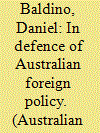

|
|
|
|
|
| Summary/Abstract |
While interrelated issues and challenges can only expand, the study of foreign policy in Australia is not a very healthy discipline. While not wholly wedged on life-support, there are genuine grounds for concern about the decline of Australian foreign policy (AFP) as a subject for serious academic concentration and its position as a marginalised topic of analysis. Unfortunately, attempts to reinvigorate the field continue to contend with a number of ingrained biases. AFP can be incorrectly dismissed as muddled and marginal while major debate points in the field are often glibly portrayed as broadly settled. This is despite the that fact that it can provide unique insights into policy-making in the twenty-first century while teaching students the benefits of problem-solving through a multi-disciplinary lens. Additionally, there is an ever-changing, contested set of knowledge that future leaders will need to consider in order to be successful, critical thinkers in a multi-agency environment. This will continue to incorporate an evolving variety of significant issues that constitute both conventional and unconventional threats to national interests.
|
|
|
|
|
|
|
|
|
|
|
|
|
|
|
|
| 5 |
ID:
170408
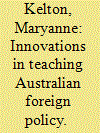

|
|
|
|
|
| Summary/Abstract |
More than ever as the uncertainties of a digitalised world are upon us and where power shifts to and within the region disrupt the familiar patterns of engagement, the acquisition of the knowledge and competencies necessary for Australia to be a trusted international partner are pressing matters. So too, in the development of both personal and professional skills, our pedagogic remit to students guides us to assist them in learning more about themselves in the process. How, then, should we teach Australian foreign policy and in doing so grow the conjunctive tissue of student self-learning in order to prepare students for the world of diplomacy necessitated by Australia's international workspace? Here, experiential learning can have a powerful effect in the teaching of Australian foreign policy and in the development of students' life and professional skills. Both in-person simulations situated within the context of a thoughtful curriculum, and short-term international mobility study tours can contribute to an effective mix of learning experiences and assist us in moving closer toward effective practice in the current uncertainties and an era of digital transformation.
|
|
|
|
|
|
|
|
|
|
|
|
|
|
|
|
| 6 |
ID:
170414
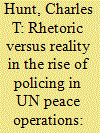

|
|
|
|
|
| Summary/Abstract |
United Nations police (UNPOL) have become increasingly important to operational effectiveness of peace operations. For some time, their contribution to re-establishing the rule of law in conflict-affected states has been seen as a cornerstone for building sustainable peace and enabling mission exit strategies. In a departure from traditional peacekeeping and post-conflict assistance, recent years have seen UN peace operations directed to stabilise countries and protect civilians in the context of on-going violent conflict. As a result, UNPOL have had to undertake a range of expanded tasks, exacerbating long-standing challenges and producing new impediments to their operational effectiveness. At the same time, a ‘pragmatic turn’ is generating increased interest in more police-centric concepts of peacekeeping as a possible alternative to today’s expensive and military-focused peace operations. Drawing on extensive fieldwork in multiple peace operations and at UN headquarters, this article examines the changing roles of UNPOL in a new breed of UN peace operations, identifies the major associated challenges and proposes a series of recommendations for overcoming them. It argues that if police are to respond to unfolding challenges while becoming more central to peacekeeping outcomes, then significant reforms and further research into their impacts will be required.
|
|
|
|
|
|
|
|
|
|
|
|
|
|
|
|
| 7 |
ID:
170412
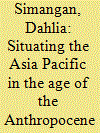

|
|
|
|
|
| Summary/Abstract |
The unprecedented and unsustainable impact of human activities on the biosphere threatens the survival of the Earth's inhabitants, including the human species. Several solutions have been presented to mitigate, or possibly undo, this looming global catastrophe. The dominant discourse, however, has a monolithic and Western-centric articulation of the causes, solutions, and challenges arising from the events of the Anthropocene which may differ from the other epistemes and geographies of the world. Drawing on the International Relations (IR) critical engagement with the Anthropocene, this paper situates the Asia-Pacific region in the Anthropocene discourse. The region’s historical and socio-ecological characteristics reveal greater vulnerability to the challenges of the Anthropocene compared to other regions while its major economies have contributed recently to the symptoms of the Anthropocene. On the other hand, the region’s ecocentric philosophies and practices could inform strategies of living in the Anthropocene. This contextualised analysis aims to offer an Asia-Pacific perspective as well as insights into the development of IR in the age of the Anthropocene.
|
|
|
|
|
|
|
|
|
|
|
|
|
|
|
|
| 8 |
ID:
170404
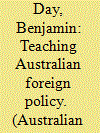

|
|
|
| 9 |
ID:
170407


|
|
|
|
|
| Summary/Abstract |
In the current higher education context there are strong incentives for the development of work-ready skills for graduates. In this article, I reflect on the challenges of mediating between developing vocational skills and emphasising the immediate practical and policy relevance of coursework on one hand, and the development of critical thinking and research skills on the other, in the context of teaching Australian Foreign Policy.
|
|
|
|
|
|
|
|
|
|
|
|
|
|
|
|
| 10 |
ID:
170409
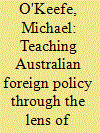

|
|
|
|
|
| Summary/Abstract |
Australian foreign policy is often taught in a purely descriptive way or as a case study for critiquing various international relations theories. Neither approach does justice to the rich historical traditions in foreign policy making in Australia or to the trends shaping the way students are exposed to foreign policy issues in the digital age and teaching can be enhanced if these trends are engaged with. Reflection on Australia's unique strategic culture can provide a pluralistic narrative plot that connects both IR approaches to particularistic attributes of AFP practice and also the lived experience of students with current events as they unfold.
|
|
|
|
|
|
|
|
|
|
|
|
|
|
|
|
| 11 |
ID:
170410
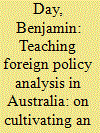

|
|
|
|
|
| Summary/Abstract |
The United States-centric nature of the Foreign Policy Analysis (FPA) subfield poses a range of pedagogical challenges, especially when the subject is taught outside North America. The preponderance of FPA literature written by US scholars and examining US cases can frustrate non-US students, who often wish to study decisions they consider more directly relevant to their own region and experience. I this piece, I reflect on how I have grappled with this tension in teaching a postgraduate FPA course at the Australian National University. I discuss my choice to prioritise cultivating an ‘FPA disposition’ among students and how, as a means of doing so, I chose to design a curriculum based on a semester-long case study examining the US decision to invade Iraq in 2003. While this pedagogical approach may initially seem contradictory to my long-term aim of contributing to the expansion of FPA beyond North America, it reflects my conviction that instilling an ‘FPA disposition’ in the next generation of graduate students is essential to growing and enriching the subfield in the long term.
|
|
|
|
|
|
|
|
|
|
|
|
|
|
|
|
|
|
|
|
|